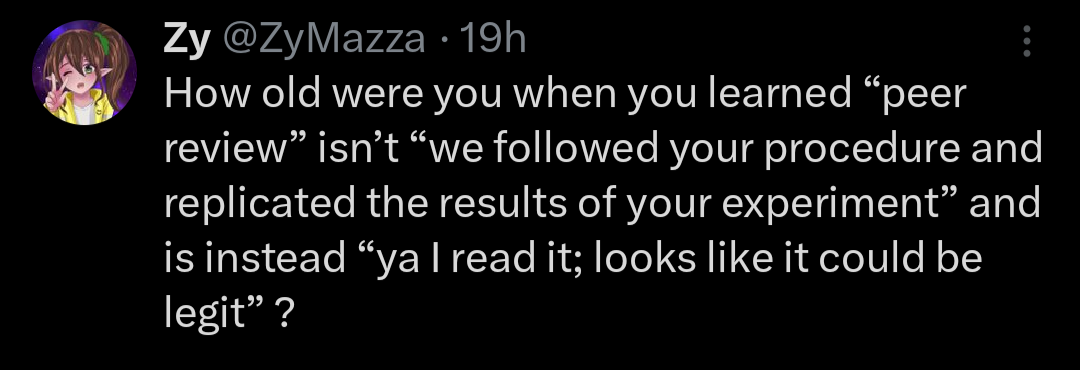this post was submitted on 15 Aug 2024
860 points (98.1% liked)
Science Memes
16553 readers
652 users here now
Welcome to c/science_memes @ Mander.xyz!
A place for majestic STEMLORD peacocking, as well as memes about the realities of working in a lab.

Rules
- Don't throw mud. Behave like an intellectual and remember the human.
- Keep it rooted (on topic).
- No spam.
- Infographics welcome, get schooled.
This is a science community. We use the Dawkins definition of meme.
Research Committee
Other Mander Communities
Science and Research
Biology and Life Sciences
- !abiogenesis@mander.xyz
- !animal-behavior@mander.xyz
- !anthropology@mander.xyz
- !arachnology@mander.xyz
- !balconygardening@slrpnk.net
- !biodiversity@mander.xyz
- !biology@mander.xyz
- !biophysics@mander.xyz
- !botany@mander.xyz
- !ecology@mander.xyz
- !entomology@mander.xyz
- !fermentation@mander.xyz
- !herpetology@mander.xyz
- !houseplants@mander.xyz
- !medicine@mander.xyz
- !microscopy@mander.xyz
- !mycology@mander.xyz
- !nudibranchs@mander.xyz
- !nutrition@mander.xyz
- !palaeoecology@mander.xyz
- !palaeontology@mander.xyz
- !photosynthesis@mander.xyz
- !plantid@mander.xyz
- !plants@mander.xyz
- !reptiles and amphibians@mander.xyz
Physical Sciences
- !astronomy@mander.xyz
- !chemistry@mander.xyz
- !earthscience@mander.xyz
- !geography@mander.xyz
- !geospatial@mander.xyz
- !nuclear@mander.xyz
- !physics@mander.xyz
- !quantum-computing@mander.xyz
- !spectroscopy@mander.xyz
Humanities and Social Sciences
Practical and Applied Sciences
- !exercise-and sports-science@mander.xyz
- !gardening@mander.xyz
- !self sufficiency@mander.xyz
- !soilscience@slrpnk.net
- !terrariums@mander.xyz
- !timelapse@mander.xyz
Memes
Miscellaneous
founded 2 years ago
MODERATORS
you are viewing a single comment's thread
view the rest of the comments
view the rest of the comments

A peer review really is just someone checking for glaring errors. If a paper gets published and someone had some real beef with it, best they can do is some of their own research to prove how shitty the other team was. After that, there are some journals that will publish letters where people comment on previous articles. But generally, most articles just get mildly ignored. It's only after a pattern of corroborating evidence piles up that people will start to say that the results of a particular early study were significant.
Mind you, the details about how this consensus process works varies from field to field. Particle physics has a different culture than hydrology. But, in general, one paper is not enough to hang your hat on.
I'm sorry, but this seems like a profoundly archaic, indirect, and unnecessary way to format it.
And with how brief you people seem to describe these peer reviews, they're apparently lower effort than a good reddit comment, yet they cannot be directly publicly visibly attached to the article they are directly reviewing?
Academia can't be too proud to take a hint of inspiration from the mitigating effects of well-informed internet comments and Twitter's community notes against low quality content?
Why would intelligent people shackle their own publications by simulating the limitations of last century? Separately published "letters"? Honestly?
The few times I've heard the processes of papers and journals described, they seem to be clinging to the logistical solutions of physical paper with some kind of demented nostalgic love for the flaws of it.